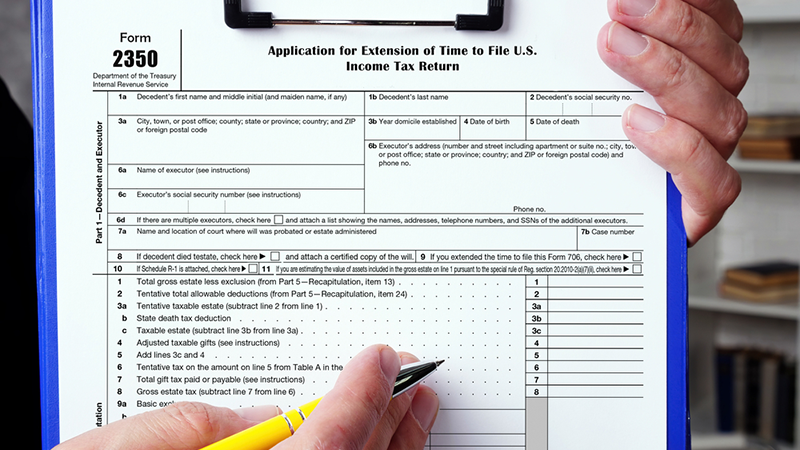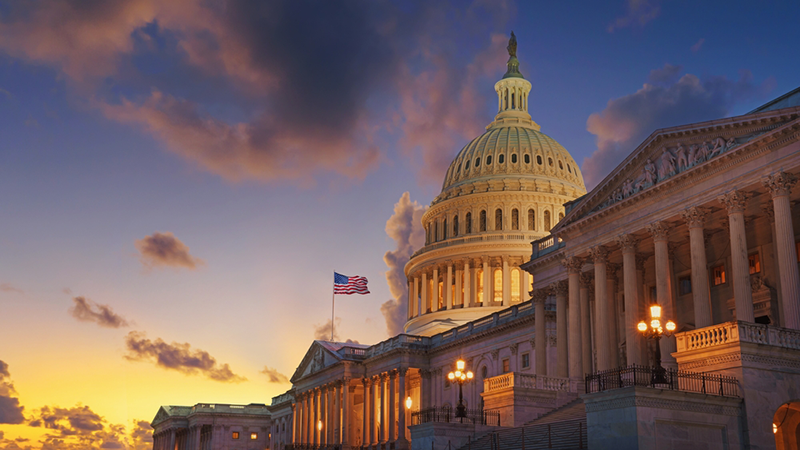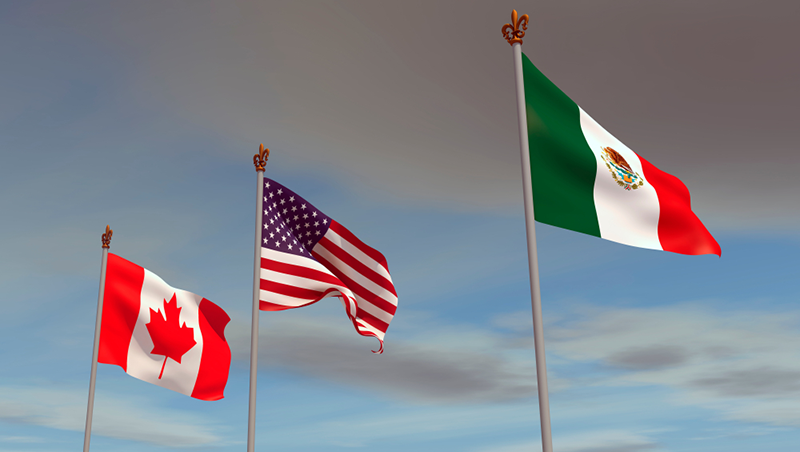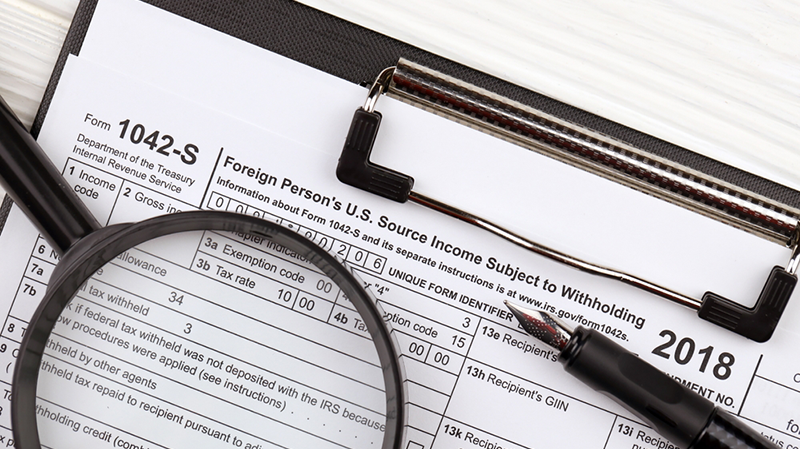The One Big Beautiful Bill Act: A Tax Perspective for U.S. & Global Stakeholders
What is the One Big Beautiful Bill Act? The OBBBA is a broad tax and spending package enacted on July 4, 2025. It combines individual tax relief...
7 min read
 H&CO
Aug 25, 2025 8:23:48 AM
H&CO
Aug 25, 2025 8:23:48 AM

For U.S. citizens and resident aliens living or working abroad, tax obligations can become complicated—especially when it comes to claiming the Foreign Earned Income Exclusion (FEIE) or other benefits under the U.S. tax code. One tool available to qualifying taxpayers is IRS Form 2350, Application for Extension of Time to File U.S. Income Tax Return.
This article explains who should file IRS Form 2350, its purpose, when and where to file, how to avoid common errors, and key considerations for individuals, businesses, and investors with international ties.
IRS Form 2350 is not a general extension of time to file your tax return (like Form 4868). Form 4868 is used to request a federal tax extension, allowing taxpayers to file their federal tax return within an additional time frame. Form 2350, on the other hand, serves a different purpose. Instead, Form 2350 is specifically designed for U.S. taxpayers living abroad who need extra time to meet the “bona fide residence test” or the “physical presence test” to qualify for the Foreign Earned Income Exclusion (FEIE), the Foreign Housing Exclusion, or the Foreign Housing Deduction.
While you can file an extension for your federal tax return using Form 4868, which grants a federal extension to file but not to pay any federal tax owed, Form 2350 is only for those who need more time to meet the FEIE requirements. If granted, Form 2350 allows you to file your return after the standard deadline, giving you time to meet the residency or presence requirements needed to exclude certain foreign income from U.S. taxation.
You should file Form 2350 if:
You are a US citizen or resident alien living and working abroad.
You expect to qualify for the foreign earned income exclusion or foreign housing exclusion/deduction, but need additional time to meet either the physical presence test or the bona fide residence test, and therefore need to request an extension.
You cannot file your return by the normal deadline (generally April 15 or June 15 if you qualify for the automatic extension for taxpayers abroad), and your tax situation requires extra time to meet the eligibility requirements for exclusions.
Requesting an extension with Form 2350 can directly impact your overall tax situation by allowing you to qualify for exclusions that may reduce your tax liability.
Important Note:
If you do not need the extra time to meet these tests, you should request an extension using Form 4868 (Automatic Extension of Time to File) instead.
Businesses and investors with overseas income generally cannot file Form 2350—this form applies to individuals. However, business owners and self-employed individuals operating abroad may need it if their personal filings depend on qualifying for the FEIE.
Purpose: Specifically for U.S. taxpayers living or working abroad who need extra time to qualify for the Foreign Earned Income Exclusion (FEIE) or Foreign Housing Exclusion/Deduction.
Who Files: U.S. citizens or resident aliens abroad who cannot yet meet the bona fide residence test or physical presence test by the regular filing deadline.
Extension Granted: The IRS may grant a discretionary extension based on your circumstances, giving just enough time for you to meet the test (not a fixed period). You must provide specific dates on Form 2350 to justify your request.
Taxes Due: Must still be paid by the regular due date (April 15 or June 15 for those abroad).
Special Use: Only used when you need more time to qualify for exclusions related to foreign-earned income.
Purpose: A general extension form that anyone can use, regardless of where they live.
Who Files: Any individual who needs more time to file their tax return (U.S. or abroad).
Extension Granted: An automatic 6-month extension (to October 15 for calendar-year taxpayers) to file your federal tax return.
Taxes Due: Must still be paid by April 15 (the original due date) to avoid interest and penalties.
Special Use: Used when you already qualify for FEIE or don’t need additional time to meet residency/presence tests.
Form 2350 is used to request an additional extension beyond the standard tax extension to file your tax returns. This allows taxpayers to establish eligibility for the FEIE or foreign housing benefits by completing the residency or presence period required, and ensures your tax returns are accurate and compliant with IRS requirements so you can properly claim these exclusions and reduce taxable income.
It is not used to extend the time to pay taxes (all taxes due must still be paid by the original due date to avoid penalties and interest) or extend business entity filings (corporations, partnerships, and trusts have separate extension forms).
The Foreign Earned Income Exclusion (FEIE) is a significant tax benefit for Americans living abroad, allowing eligible taxpayers to exclude a substantial portion of their foreign-earned income from U.S. taxation—up to $130,000 for the 2025 tax year. To take advantage of the FEIE, you must meet either the bona fide residence test or the physical presence test, both of which require you to spend a certain amount of time in a foreign country or establish residency there.
For many Americans living abroad, meeting these requirements by the standard filing deadline can be challenging, especially if you recently moved overseas or your qualifying period overlaps with the tax year. This is where IRS Form 2350 becomes essential. By filing this extension form, you can request additional time to file your tax return, allowing you to meet either the bona fide residence or physical presence test and qualify for the foreign earned income exclusion.
Unlike the automatic six-month extension provided by Form 4868, Form 2350 is specifically designed for taxpayers who need more time to meet the FEIE requirements. The IRS reviews each extension request individually, and approval is not guaranteed. It’s important to carefully review the eligibility criteria and ensure your extension request is submitted before the original filing deadline. For Americans living abroad who are not yet eligible for the FEIE but expect to qualify later in the tax year, filing Form 2350 can be a crucial step in maximizing tax savings and remaining compliant with IRS rules.
Generally, Form 2350 must be filed by the due date of your return (April 15 for most taxpayers, or June 15 for those who qualify for the automatic two-month extension due to living abroad). The IRS will notify you if the extension is approved.
If you are not enclosing a payment, mail Form 2350 to:
Department of the Treasury
Internal Revenue Service
Austin, TX 73301-0045 USA
If you are enclosing a payment, mail to:
Internal Revenue Service
P.O. Box 1303
Charlotte, NC 28201-1303 USA
Electronic filing is generally available if you work with a tax professional or software provider that supports Form 2350.
When preparing Form 2350, taxpayers often make mistakes that delay approval or create unnecessary penalties. Here are some to avoid:
Assuming it extends the time to pay taxes – It does not. Paying any taxes owed is still required by the original due date, even if you file for an extension.
Filing late – The form must be submitted before your tax return due date.
Not explaining your situation – The IRS requires you to state why you need the extra time (for example, you will not meet the physical presence test until a certain date).
Waiting for your host country's tax assessment – If you are awaiting the finalization of your host country's tax assessment, this can be a valid reason for requesting an extension.
Using it unnecessarily – If you already meet the requirements for FEIE by your filing date, use Form 4868 instead.
Incorrect mailing address – Make sure you send your form to the correct IRS location.
Forgetting to include payments – If you owe taxes, include an estimated payment with your request to avoid penalties and interest on unpaid taxes owed.
Although Form 2350 is primarily for individuals, it has indirect implications for businesses and investors, particularly regarding income taxes and US taxes for the taxpayer:
Self-employed individuals abroad – If you run a business overseas, you may use Form 2350 to qualify for FEIE, which lowers taxable income and affects your self-employment tax obligations. This can impact the timing and calculation of your income taxes and US taxes as a taxpayer living abroad.
Investors living abroad – Investment income (dividends, capital gains, interest) does not qualify for the FEIE, but extending your return with Form 2350 ensures accurate reporting and coordination with foreign tax credits, helping the taxpayer avoid double taxation on US taxes.
Business owners with pass-through entities – Your personal eligibility for the FEIE can affect the overall tax strategy of your business income, influencing how income taxes and US taxes are managed for the taxpayer.
Failing to file your tax return or submit an extension request like Form 2350 by the required deadline can lead to serious financial consequences. The IRS imposes a late filing penalty of 5% of any unpaid taxes for each month your return is late, up to a maximum of 25% of your total tax bill. In addition, if you owe taxes, a late payment penalty of 0.5% per month applies, along with daily compounding interest charges starting from the original due date. These penalties can quickly add up, especially for expats with significant foreign income.
Missing the deadline can also jeopardize your eligibility for the Foreign Earned Income Exclusion, potentially increasing your tax liability for the year. If your extension request is denied, you are required to file your tax return immediately to minimize penalties, even if you have not yet met the requirements for the FEIE. In such cases, you may need to file an amended return later once you qualify for the exclusion.
Given the complexity of expat taxes and the high stakes involved, it’s wise to consult a tax professional who specializes in international tax matters. A qualified tax preparer can help you navigate extension requests, avoid costly mistakes, and ensure you meet all your tax obligations on time. By staying proactive and seeking expert advice, you can avoid late filing penalties, interest charges, and the risk of missing out on valuable exclusions like the FEIE.
Interest and Penalties – Even with Form 2350 approval, late payment penalties and interest apply if you do not pay on time.
Foreign Tax Credits – If you cannot use the FEIE, you may still benefit from claiming a foreign tax credit using Form 1116.
State Taxes – Some U.S. states do not recognize the federal FEIE or extension rules. If you maintain state residency, you may still need to file and pay state taxes by the original deadline.
Professional Help – Cross-border tax planning is complex. Businesses, investors, and expats should seek professional guidance to maximize exclusions and credits.
IRS Form 2350 is a valuable tool for U.S. taxpayers abroad who need additional time to qualify for the Foreign Earned Income Exclusion or foreign housing benefits. While it doesn’t extend the time to pay taxes, it ensures that you can meet residency or presence requirements before filing.
For individuals, business owners, and investors working overseas, understanding when and how to use Form 2350 can prevent costly mistakes and improve your overall tax strategy.

What is the One Big Beautiful Bill Act? The OBBBA is a broad tax and spending package enacted on July 4, 2025. It combines individual tax relief...

The USMCA (United States-Mexico-Canada Agreement) is version 2.0 of the NAFTA (North American Free Trade Agreement). Since its implementation in...

When conducting business across borders or managing foreign investments in the United States, it’s crucial to understand the tax implications of...